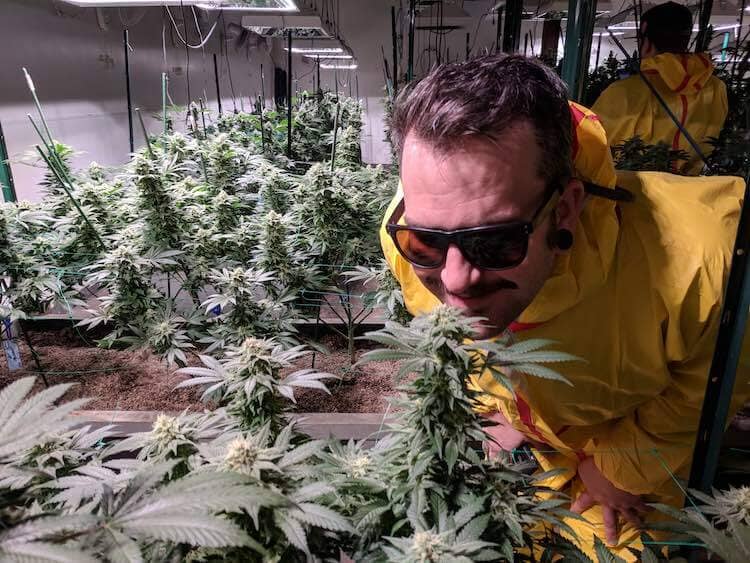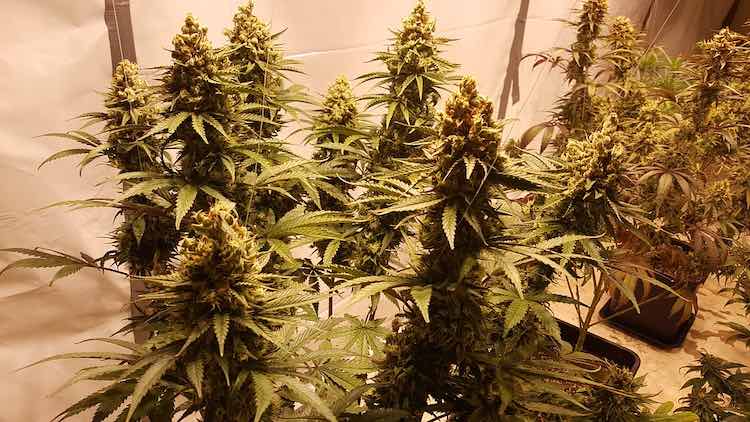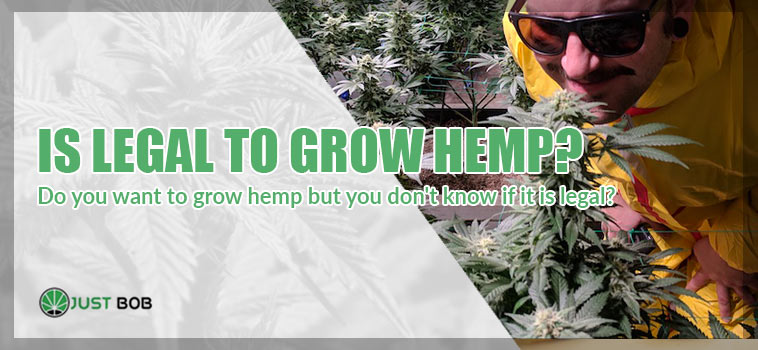Modified on: 10/08/2025
DO YOU WANT TO GROW HEMP BUT YOU DON’T KNOW IF IT IS LEGAL? DISCOVER EVERYTHING ABOUT IT
The CBD weed market has established itself among the most fruitful of recent times, giving a huge boost to the European economy (and beyond).
So, is it legal to grow hemp in Europe?
The an swer is yes, but it is necessary to clarify the current regulatory framework.
Laws on legal weed
The European legislation (The European Regulation-Delegate-n.-639-2014 and the European Regulation n. 1307/2013) promote and protect the cultivation of sativa cannabis and, consequently, allows the marketing of products derived from it.
In Europe, in fact, numerous activities have arisen such as growshops and weed seed shops specializing in the sale of products with a high CBD content, from the inflorescences of CBD flowers dried to CBD oil, but also herbal teas, clothing and much more.
The regulations support the growth of hemp for the cultivation, production of food, cosmetics and biodegradable raw materials, so as to reduce the environmental impact and encourage local companies to achieve economic growth.
This does not require any special authorization, even if farmers have to comply with certain obligations and parameters.
They must infact cultivate cannabis varieties with a low THC content: to a maximum limit of 0.02%.
This restriction linked to tetrahydrocannabinol is due to the psychotropic effects it has on consumers.
Furthermore, the grower is obliged to keep the tags of the purchased seeds and the invoices for their purchases.
In this way he can prove to the authorities that he has used the accepted varieties, it is to say legal hemp seeds registered in the European Catalog.
Are some examples of cannabis varieties allowed by law? Light marijuana Lemon Cheese, California Haze light, Master Kush light and many others.
During the checks, farmers bear no responsibility, but the camp is ordered to be seized or destroyed if the parameters imposed by the law are not respected.
This law, however, has never been very clear as regards personal consumption: according to the established previous regulations, it is not legal to consume marijuana for recreational purposes.
The only permitted use is the therapeutic one: but here we cannot speak of CBD cannabis as therapeutic marijuana has very high THC percentages.
So we have seen that it is absolutely possible to grow legal hemp at home and outdoor. But is it also possible to cultivate the therapeutic one or not?
What does the European legislation say about the therapeutic use of cannabis?
The use of cannabis for therapeutic use has become legal since 2007, so several decrees were set up to more clearly regulate the use of marijuana. Naturally, this differs from CBD buds which has no effect on the psychic faculties of consumers.
This plant produces around 150 kilos of hemp a year, although the demand has doubled lately.
This is marijuana obtainable only through medical prescriptions to certify a specific pathology of the patients, as the beneficial properties that the herb produces in our body have now been ascertained.
>> Read also: Where to buy quality CBD oil
Uses of legal hemp
Hemp is a natural resource whose properties are widely undervalued worldwide, although there has been a significant increase in the sale of Cannabis Sativa-based products.
Here’s what you can produce if you grow legal hemp:
- Foods: hemp seeds can be included in the diet as food supplements because they are rich in omega3, vitamins and mineral salts;
- Cosmetics: the vitamin E contained in the plant carries out an important antioxidant action, so as to counteract the aging of the skin. This is just one of several properties that these products, even in the cosmetic field, give to our face, body or hair;
- Oils and fuels: hemp, set as an exceptionally versatile resource, can be used to replace petroleum fuels.
The extensive uses granted by the legislation are not yet complete, since it is possible to obtain fabrics, obtain paper and apply it in the green building sector. In short, hemp is in effect a plant of a thousand resources!

Why is there a legal vacuum on legal hemp?
The controversies concerning the laws in force on the subject of cannabis are numerous, as neither the merchants nor the consumers are very clear about the use they can make of products based on CBD.
In Italy, for istance, the Court of Cassation has drawn up an incomplete law concerning inflorescences and their consumption for recreational purposes.
They are sold in specialized activities, such as Justbob, light marijuana bags that would be exclusively collectible, not for personal use.
All this, of course, is at the expense of the economic growth implemented over time for European companies, for which a revision of the laws in force is considered necessary and, above all, we must consider the enormous potential that cannabis has.
Taking CBD, in fact, helps not only to relax, but can relieve chronic pain, fight mental disorders, regulate the sleep-wake cycle … For these reasons, we feel the need to fill this void and make clear the use and methods possible intake of hemp flowers.
Greater liberalization towards cannabis-based products is hoped for, whose positive effects are innumerable and do not involve any contraindication or side effects.
>> Read also: Marijuana without THC: effects and benefits
Industrial Hemp Production in Ireland: Navigating Regulations and Cultivating Growth
In recent years, industrial hemp production in Ireland has gained momentum, positioning itself as a lucrative venture for many farmers. The cultivation of hemp, classified as an agricultural plant species, has opened new avenues for the hemp industry, spanning from hemp fibre and hemp paper to hemp oil and CBD products.
Current Legislation and Regulatory Framework:
The legal status of hemp in Ireland is governed by stringent regulations to prevent the misuse of drugs. Under the Controlled Drugs Act, hemp is distinguished from the cannabis plant, primarily due to its low tetrahydrocannabinol (THC) content. THC, a psychoactive compound found in cannabis, is limited in industrial hemp, making it legally grown for various purposes.
Licensing and Authorization:
Hemp cultivation requires a license issued by the Health Products Regulatory Authority (HPRA). Many farmers, recognizing the economic potential, have submitted an application form and entered into a rental agreement to legally grow hemp. Vehicular access to hemp fields is regulated, ensuring compliance with the current legislation.
Industrial Hemp and Its Applications:
The hemp plant, belonging to the genus Cannabis, is a versatile crop with fast-growing capabilities. Hemp-derived products such as hemp fibre, hemp paper, and hemp oil are in demand due to their diverse applications in textiles, paper manufacturing, and health products. The Food Safety Authority oversees the novel food status of hemp products, ensuring they meet safety standards.
THC Levels and Controlled Substance:
To maintain compliance with the Controlled Drugs Act, hemp farmers carefully monitor THC levels in their crops. The mature stalk of the hemp plant, devoid of THC, is not classified as a controlled substance. This distinction is crucial in distinguishing industrial hemp from its narcotic counterparts.

Challenges and Opportunities:
While industrial hemp production in Ireland has flourished, challenges remain, particularly in navigating the regulatory landscape. Farmers engaging in hemp growing must be aware of the restrictions and guidelines set forth by authorities. Additionally, exploring the potential for hemp in medicinal claims and CBD products requires adherence to evolving regulations.
Ireland as a Significant Player:
Ireland has emerged as a noteworthy player in the production of hemp, being among the largest producers in Europe. Hemp farmers contribute to the diversification of crops, offering a sustainable alternative to traditional crops like cotton. The economic impact of hemp cultivation extends beyond the agricultural sector, with implications for various industries.
As Ireland continues to foster a supportive environment for hemp production, the cultivation of industrial hemp holds promise for farmers and industries alike. The controlled and legal cultivation of hemp not only contributes to the economy but also aligns with global trends emphasizing sustainable practices, making Ireland a key player in the ever-expanding hemp industry.
Agricultural plant species: the Potential of the Hemp Plant
Cultivating hemp, an agricultural plant species with remarkable versatility, has gained significant traction globally. Hemp plants, known for their fast-growing nature and adaptability, have become a key player in the realm of fibre crops, seed oil production, and health-focused applications.
Hemp as a Fibre Crop:
One of the primary facets of cultivating hemp is its role as a fibre crop. The hemp plant yields strong and durable fibres, making it an ideal candidate for textiles, paper, and various industrial applications. Its rapid growth minimizes the environmental impact often associated with other fibre crops.
Health and Nutrition:
Hemp is a rich source of seed oil, which is extracted for its nutritional value. The seed oil contains essential fatty acids and is a popular ingredient in health-conscious diets. CBD oil, derived from hemp, has gained attention for its potential health benefits, although its regulatory status varies across jurisdictions.
Regulatory Oversight:
In many regions, including those in third countries, the cultivation of hemp is subject to regulations overseen by authorities such as the Food Safety Authority. Hemp’s designation as a novel food ensures that its products meet safety standards and adhere to guidelines set by regulatory bodies.
Controlled Substance Distinction:
While hemp shares its genus with the cannabis plant, it is crucial to note that hemp plants are grown primarily for industrial purposes and contain minimal levels of THC, the psychoactive compound found in cannabis. This distinction positions hemp as a controlled drug only when THC levels exceed legal limits.
Licensing and Global Impact:
Licence issuance for growing hemp is a regulated process, ensuring compliance with local laws. As one of the largest producers of hemp, the global impact of hemp cultivation extends beyond national borders. Farmers engaging in the cultivation of hemp contribute to the diversification of crops and the promotion of sustainable agricultural practices.
Challenges and Considerations:
While the hemp plant offers numerous benefits, challenges persist, including concerns about pesticide use and the need for standardized regulations across borders. Addressing these challenges is crucial for maximizing the potential of hemp in various industries.
The hemp plant, with its myriad applications and sustainable attributes, continues to captivate farmers, researchers, and industries worldwide. From fibre crops to health products, hemp’s versatility positions it as a valuable asset in the evolving landscape of agriculture and beyond. As cultivation practices and regulations continue to develop, the hemp plant stands poised to play a pivotal role in shaping the future of sustainable and multifaceted agriculture.
The new law prospect on CBD weed
Naturally, the problems related to the cultivation, production and sale of hemp are not foreign to politics.
A new bill law prospect has been proposed to finally make the situation clearer: to legalize marijuana and hashish, to follow in the footsteps of other countries.
Currently, no definitive positions have been taken, but many important personalities have understood the importance of legalization. Thus it will be possible to continue to support our countries economy and stop illegal trafficking, putting an end to the prohibition that has always characterized most of Europe and finally taking a step forward.





